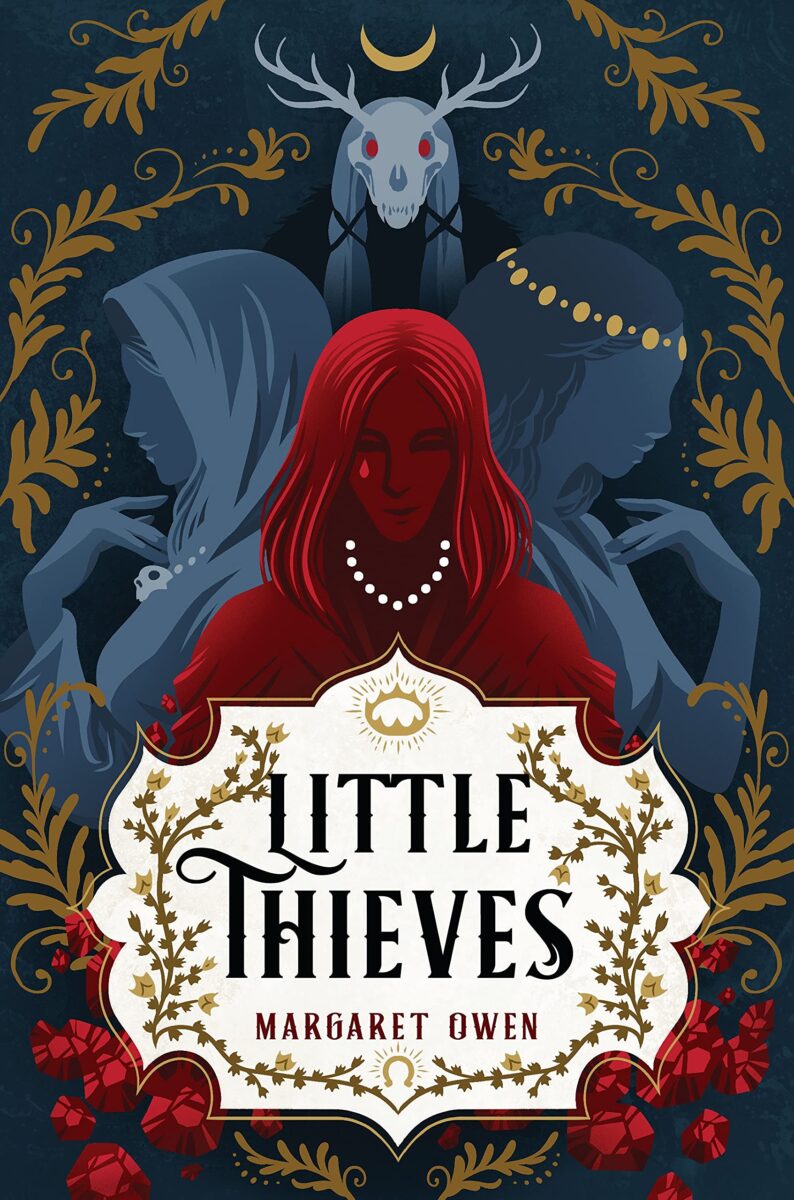It’s a lovely morning in the village, and you are a horrible girl.
Wait.
Goose. You’re a horrible goose. Well, you’re a horrible goose girl. The Goose Girl, to be more specific—or both of them, the princess with the disobedient servant and the servant who steals her mistress’s place in the Grimm’s version. The fairy tale is about punishing those who dare to step out of the socio-political hierarchy. Little Thieves is not. It is so entirely, ferociously not about that at all.
It is, however, still about rules. The rules of society, the rules for women, the rules for the wealthy. It’s about how to inhabit those rules, how to use them to get yourself every advantage, how to bend them to get every whim—and then finally, it’s about how to break them. And it starts—no not ends, starts—with a massive heist.

The setup is immensely interesting from the get-go, and more than that, it’s fun. And so is our (anti-)heroine, who’s got the charisma of the whole Ocean’s Eleven team rolled up into one person.
Well, one ish. See, Vanja was born a poor girl, but harsh experience taught her that it wasn’t so great to be herself. So she traded up: she stole a prinzessin’s appearance and identity. And that was enough to ensure her safety for a time, but it didn’t guarantee it forever—and it didn’t give vent to her rage at the unfairness of her life up to that point. And so in. addition to being prinzessin Gisele, she also became a thief who preyed on the upper classes, a swindler so skilled they dubbed her the Pfennigeist. This is a nice gender swap of the Loveable Rogue trope, allowing a woman to be the coy and irrepressible one, cracking jokes at inopportune times and letting her charisma carry her through sticky situations. She even uses secret communication devices to send rude drawings. She’s the Kirk, the Han Solo, the Doug Judy, the…you get the idea.
None of this is a spoiler, by the way; it’s setup. We learn all of this in the first chapter. Owen is fearless with her clever ideas, going through them as fast as Vanja swaps between identities. But she delves deep into her characters. I already knew Margaret Owen was good at getting me to love her characters, but I wasn’t expecting to fall so fast or so hard for Vanja. She announced 20 pages in that this was the story of how she got caught. And even after those 20 pages, I already didn’t want her to be. I already loved precious, devious Vanja and I never, ever wanted any harm to come to her.
Impossible, of course. Vanja doesn’t just have one past, she has three, all of them waiting to catch up with her. In her own life, she has a trifecta of gods meddling in her life. As Gisele, she has a pesky betrothal that can no longer be put off. And as the Pfennigeist, she has a prefect asking too many questions. Vanja is equal to any of them, but is she equal to all of them? And is she equal to all of them with deadlines looming and an even more sinister plot afoot?
Yes, Vanja might need help, but it turns out that being vulnerable is much more challenging than robbing the rich and famous. Owen understands that trauma makes you self-protective, and much of Little Thieves is about the blurry lines between self-defense and selfishness. You have to focus on yourself and meeting your own most basic needs for comfort and safety, but how much are you allowed to trample on others’ wellbeing to ensure your own? Vanja makes a lot of questionable choices, but Owen never lets us think that Vanja is a horrible person. She gives Vanja space to grow and learn.
Owen has compassion for all of her main characters, the kind of thoughtful compassion that doesn’t let them off the hook for the consequences of their actions, but also doesn’t force them to become trite moral parables instead of people. It is one of the greatest compliments I can give when I say that Owen writes for complexity. Not just with it, but for it: she wants more nuance, she wants more intersection, she wants much more than good and evil. She wants to understand the larger societal forces at work that enable evil, the contexts that perpetuate it, and the small but mighty ways that people find to resist. And the resistance of even a few is enough to make even the gods question how the world works, and how it should work.
I could go on at much greater length, but really, Little Thieves is just a pure triumph of a book. I have exactly one criticism of this book. Just one. Why isn’t there a goose?
Okay, okay, I get that there doesn’t actually need to be a goose. I just really think Owen could have written an excellent talking goose, or pet goose, or even goose-related scene. C’mon, the horse showed up!
Other than that lone (facetious) critique, I have nothing to say except bravo, bravo, bravo.
